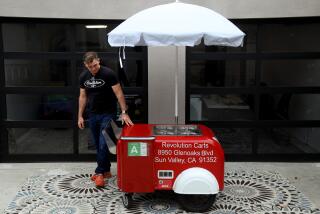Returning a Profit on Shopping Carts : CARTS: Returners Turn a Profit
- Share via
Tony Scott, a 30-year-old drifter from Louisiana, has finally landed the kind of job he has always dreamed of. He is out in the sun, getting some exercise, and the money just keeps rolling in.
On most days, Scott can be found at the Ralphs store at Fairfax Boulevard and 3rd Street returning shopping carts for the 25-cent deposit customers pay to take the carts out of the store.
Ralphs began requiring the deposit more than a year ago at some of its stores to prevent cart thefts and to encourage shoppers to return them to racks so they don’t sail into parked cars.
Ironically, the policy has also provided a moneymaking opportunity for the young, the old and the down and out who are willing to return carts for customers for the 25-cents deposit.
‘Ongoing Problem’
Officially, one Ralphs manager said, the soliciting is considered an “ongoing problem.” And it is prohibited by signs posted in the parking lot. But more often than not, the parking lot hustlers are allowed to work if they do not hassle the customers.
“I provide a service,” said Scott, who roamed the parking lot dressed in tattered cutoff pants, a T-shirt and sneakers. He spotted a customer wheeling a cart about 50 yards away and walked over to the shopper. “Excuse me. Would you like me to return your cart when you are finished?” he asked.
Scott said he had not been in Los Angeles long. He lives at a mission where he also eats his meals. “Working here in the parking lot helps keep me out of trouble,” he said. “I figure I might be out doing something wrong if I wasn’t here.”
Some days, as many as eight people work the lot, competing for the quarter deposits. On Tuesday, Scott was joined by 16-year-old Esteban, who said he spends an hour or two there after school, and a 70-year-old Russian immigrant who spoke little English. The elderly man said he intended to buy a can of soup, a loaf of bread and a roll of toilet paper with the money he earned from returning carts.
Though Scott remained busy, returning up to 20 carts in about an hour Tuesday afternoon, he was reluctant to discuss how much money he made. “I try to make enough for bus fare to carry me to the mission where I can eat,” he said.
Esteban, who hustled carts in another section of the parking lot, said, “Usually you are not the only one out here, but if you are lucky you can earn $5 in two hours.”
Shoppers pick up their carts in the supermarket. They pay a 25-cent deposit to take the carts out of the store when they pay for their groceries. After unloading their purchases, they return the carts to a rack and get their quarters back. The cart rack is modeled after the luggage-carrier rental system that has been in use for years at Los Angeles International Airport. The system is manufactured by Smarte Carte Inc. of White Bear Lake, Minn.
“What we have done is install the system in high cart-loss stores or areas where there are many shoppers who live in apartments,” said Jan Charles Grey, senior vice president at Ralphs. “By taking a quarter and giving it back it allows us to have shopping carts available at no cost to the customer.” Ralphs has installed the device in nine of its 125 stores.
The problems with the system have been minor, said Grey. “Like any situation, sometimes you get some over-aggressive children who want to get the 25 cents,” he said.
Steven Koff, president of the Southern California Grocers Assn., said the cart deposit system is one of many efforts by stores to stop shopping cart thefts. Losses have been estimated at $4 million annually. “What works at some stores does not work at others,” he said.
Shopper Jeannetta Kendall said she finds the offers of help “harassment” and has complained about the “aggravation.”
“When you walk out the door they immediately come over and ask you if they can take your cart after you finish unloading your groceries. Well, if I can manage to unload my groceries then I can take the cart back,” she said.
Estella Woods, another shopper, said that she does not mind. “Sometimes when I see a little kid or someone who doesn’t have the money I let them have my cart. If you are hungry, you are hungry.”
More to Read
Sign up for Essential California
The most important California stories and recommendations in your inbox every morning.
You may occasionally receive promotional content from the Los Angeles Times.













